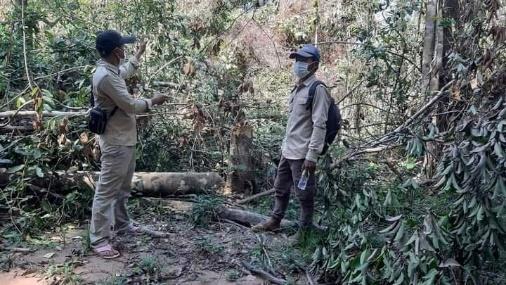RESULTS SUMMARY
Capacity strengthening keeps forestry network in the fight against deforestation
Author: Danmission (2023) Find project on OpenAid

PROJECT
Title: Internal Strengthening and Consolidation of the Forestry Network
Partner: Forestry Network (anonymised)
Country: Cambodia
Period: January 2022 – December 2025
CHANGE
A dedicated team of forest guardians who volunteer within the Forestry Network to combat illegal logging and safeguard biodiversity has regained their strength despite enduring years of pressure, restrictions, and threats to their safety and well-being. The strengthening of the network results from various initiatives to improve capacity, increase knowledge, support governance, and, in general, impose a sense of solidarity and team spirit. This change is crucial to ensure the Forestry Network can continue to deter illegal logging, conduct community-based forest monitoring, enhance the resilience of local forest guardians, and link lessons learned to the international community. Recently, the Forestry Network has even experienced recognition from national authorities in a government crackdown on illegal logging
The Forestry Network is working to improve the stewardship of a large lowland evergreen forest in Cambodia. The forest has suffered from unprecedented levels of deforestation due to illegal logging and land clearance. The forestry network faces significant challenges in preventing illegal logging and protecting biodiversity, including shrinking civic space, intimidation and surveillance of forest guardians, authority restrictions on community-based monitoring, and widespread forest crimes. The closing of civic space since 2017, compounded by the impact of COVID-19 and a ban on forestry network patrols, has made it even more difficult for the forestry network to operate.

The change has been possible with the support from partners locally and internationally. Danmission has supported the Forestry Network since 2014 through various projects and capacity-strengthening initiatives, including DANIDA, that have substantially increased the network’s capacity and empowered it to maintain its autonomy to continue its vital work in the conflicted and dangerous forest protection area. The initiatives have significantly strengthened the Forestry Network’s internal structure and have developed its members, for example, by providing training to improve members’ understanding of Cambodian Forest Law and their rights to access forest resources.

Elder network members here demonstrate how to conduct a tree ordination ceremony for younger members to carry on the initiative to protect trees.

Forestry guardians from the forestry network patrol the forest and document the changes created by illegal logging.
See next page for more details
ADDITIONAL INFORMATION
Primary activities have included capacity strengthening and knowledge building on environmental laws, community rights, technical use of the data collection app, and forest monitoring and data uploading. Furthermore, it has also included initiatives to strengthen the structure and coherence of the network itself, such as annual meetings to select a core group and elect a coordination committee to conduct coordinating meetings. As a third focus, the project has also entailed network members’ participation in local and international events and community dialogue forums with local authorities. These activities have built confidence, trust, and stronger relationships within the network and among local communities, government representatives, and forestry activists. This has furthermore increased the abilities and confidence of the network members to engage in dialogue with local authorities about the level of deforestation and other forest challenges, such as declining biodiversity. A part of the partnership with Danmission and other partners has been to develop a tracking app for the members to collect data during patrols to document the situation systematically, explain the forest changes, and advocate on behalf of the forest.
LESSONS
Firstly, working to protect a forest means an interface with a wide range of stakeholders is needed. The government relationship is especially important but extremely challenging, given the authorities' unwillingness to engage. This means that progress happens very slowly, and sometimes progress turns regressive, requiring initiatives and projects to be designed with long-term and resilient approaches. Secondly, given the sensitive nature of the issues related to the forest, there is a need to conduct a thorough Do No Harm analysis and always remain cautious when engaging in the forest space.
The change is documented through extensive monitoring and evaluation, with two reports completed each year and several case stories collected through Outcome Harvesting.
EVIDENCE
Development strategy priorities:
Climate, Nature and the Environment
Changes in the lives of people facing poverty, marginalisation or vulnerability -
Changes in laws, policies and practices that affect people’s rights -
Changes in the capacity of organisations and communities to support rights X
Changes in partnerships and collaborations that support people’s rights -
Changes in participation of groups facing poverty, marginalisation or vulnerability X
Changes in local leadership of development and humanitarian work -
